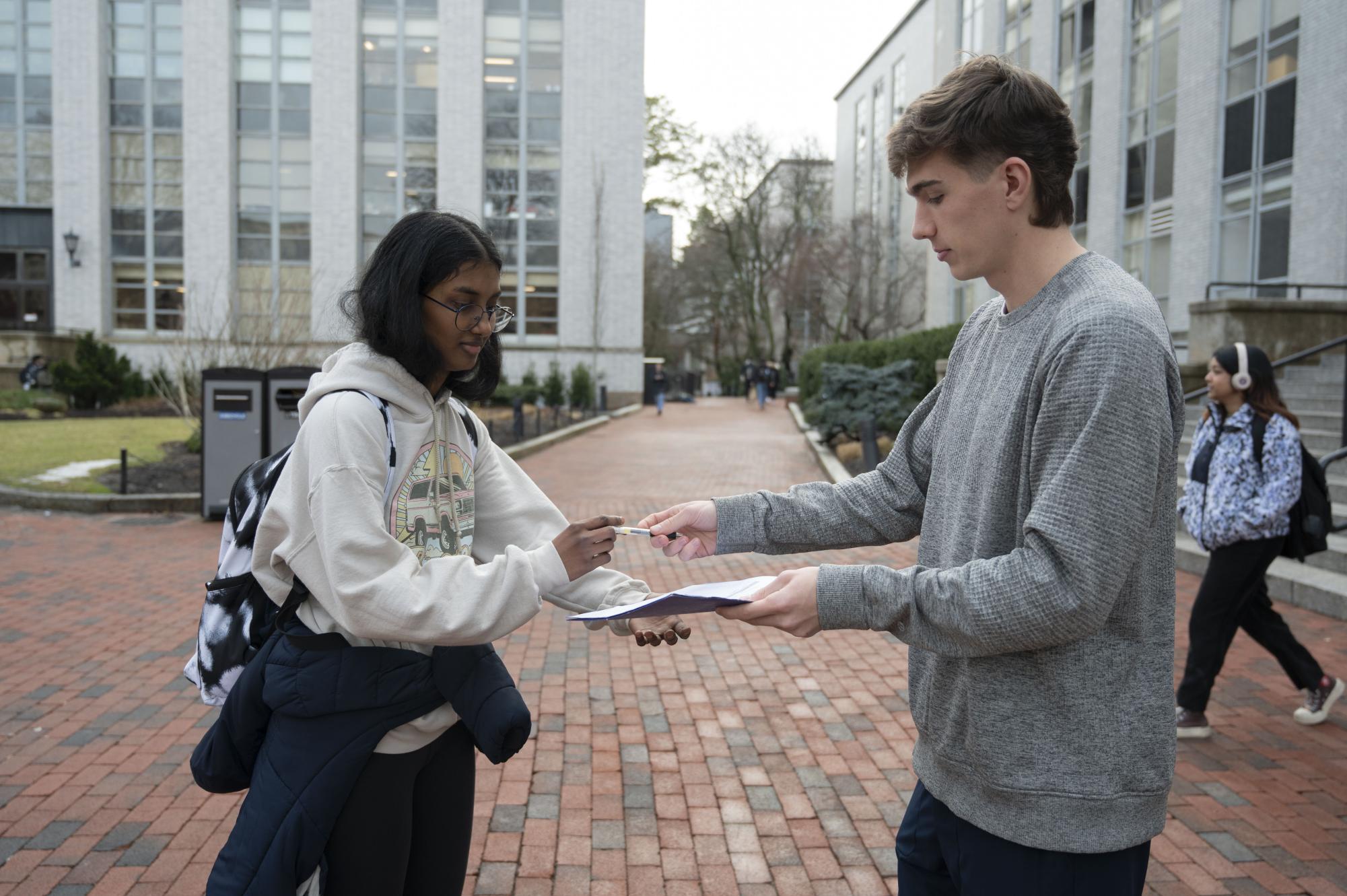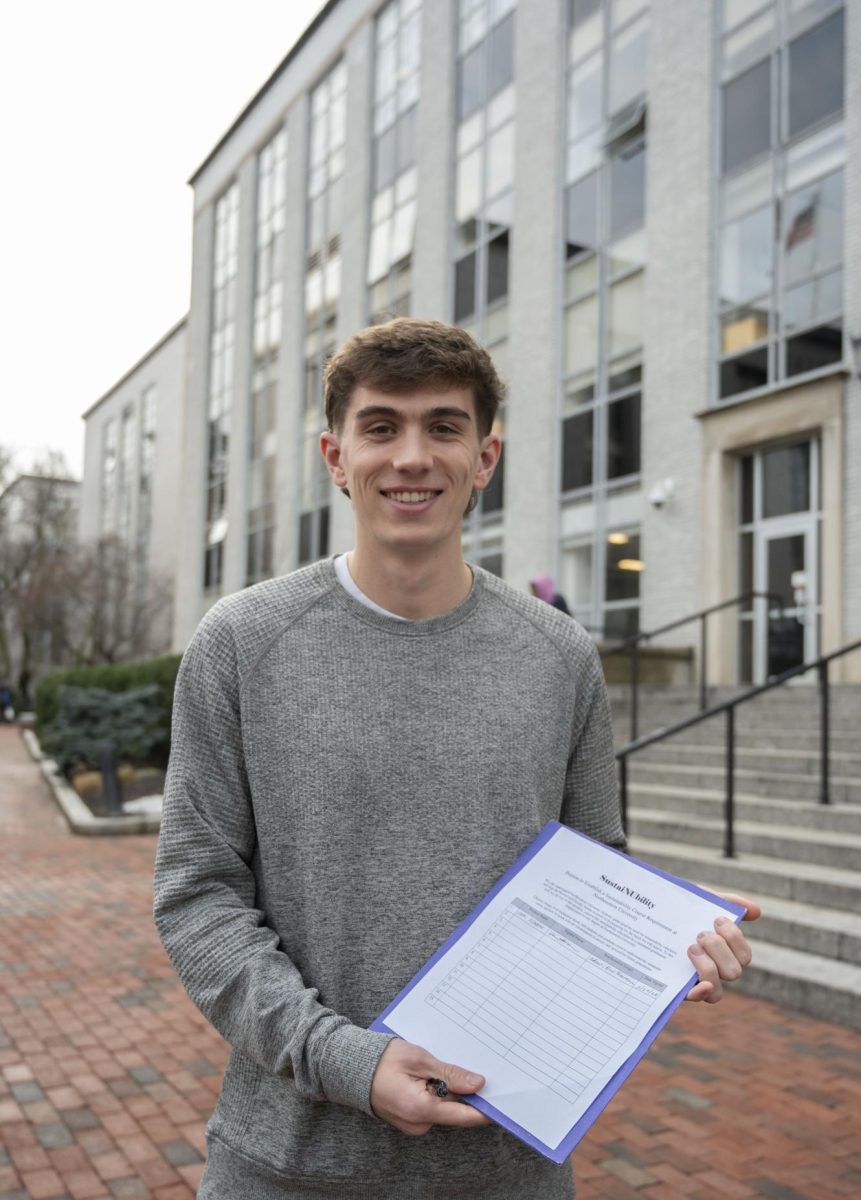When Tyler Brogan, a fourth-year environmental and sustainability sciences and economics combined major, took Northeastern’s Economics of Sustainability class, he became worried — worried about what he was learning and worried that others may be oblivious to the same information.
“That class talked about how the economic system we have now negatively affects the environment and society,” said Brogan, who took the course during his second year. “It was pretty scary to learn all that stuff.”
The course led him to consider the lack of knowledge about sustainability among the Northeastern student body. Last year, Brogan decided to embark on a mission to fundamentally change the Northeastern curriculum by petitioning the school to institute a sustainability class into NUpath, the school’s core curriculum requirements, through the student organization SustaiNUbility.
“I learned a lot of things in that class that I hadn’t learned in my time as an environmental science student, and that made me think ‘Alright, if I’m still learning new stuff from a class like this, how are people who are in different majors — say history or business — supposed to learn this information if they are not exposed to it all,’” Brogan said.
Instead of adding the credit to the current required curriculum, Brogan envisions a sustainability credit replacing one of the current NUpath requirements.
“Everyone should have to take a class like this; this is pretty serious stuff,” Brogan said. “Everyone should have to know it.”
The NUpath program is “built around essential, broad-based knowledge and skills” and ”integrated with specific content areas and disciplines.” According to the university’s website, it’s meant to offer students the flexibility to integrate core learning into their individual educational journeys through 11 course requirements.
Brogan said he spoke to a university vice provost in November 2023 but wasn’t met with the solution he had envisioned.
“They gave a few options that aren’t exactly what I’m looking for, for example simply just having a speaker series about sustainability [and] a couple others,” Brogan said. “None that I thought would make an impact like [making the credit a part of NUpath] would. Ninety-nine percent of the people who would go to a speaker series, in my opinion, are going to be people who already know and care about learning about the environment, so I don’t think it would have as much of a reach as this will.”
Since creating the petition in April 2023, Brogan’s petition has gained over 900 signatures. He plans to collect a total of 1,500 to 2,000 signatures, or 10 to 15% of the student body, before presenting it to university administration.
“The hope is that when we get to our signature goal, it will be enough student support to have a conversation with the faculty senate, which is in charge of program requirements,” Brogan said.

He also hopes to work with the Student Government Association, or SGA, on the cause.
“Getting a referendum through to the student hub — that is definitely something I am going to pursue,” Brogan said, referring to the yearly voting the SGA holds on select initiatives. . “Hopefully that can be, if it gets chosen as one of the questions, a sort of second support in terms of what we’ll have to show student support other than the signatures themselves.”
While some students may be unaware of SustaiNUbility’s petition, they recognize the benefit of a required sustainability credit.
“I think that would be wonderful, I think it would complement the ethics one. I don’t know a lot about the requirements but I think it would complement them very well,” said Shreya Chandran, a second-year chemical engineering and bioengineering combined major. “Some of the NUpath’s are kind of questionable. We have a critical thinking-based one and a scientific reasoning one, but those are just semantics.”
Chandran continued, reflecting on the impact of the requirement for STEM, or science, technology, engineering and math students.
“As an engineer, I think it’s very, very essential,” Chandran said. We do talk about ethics in a lot of our classes, but incorporating sustainability in that would be very useful.”
Linden Burack, a second-year physics major and member of SustaiNUbility, holds strong opinions on the matter.
“I know that gen-eds is a bad word,” Burack said. “A lot of people come to Northeastern because it has a minimal number of gen-eds. That said, this is the biggest issue of our generation and I do truly think it will make a difference for every student who goes through this university to make contact with the issue of climate change at a college level.”
Brogan’s decision to collect exclusively physical signatures poses a challenge during the cold winter months when volunteering students cannot collect signatures outside. To remedy this, Brogan is asking students who wish to support the cause to contact him directly. In addition, he has been working with professors to advocate for this change by going into classes and briefly pitching his initiative.
“I think Northeastern is a very innovative school where our students are going to do great things beyond college,” Brogan said. “So it’s my hope that if our students take a class like that, and they learn these scary things, there will be some people who are impacted by it and if, say, they go on to be an entrepreneur or to start their own business, they do it more sustainably because they learned from a class like that.”













